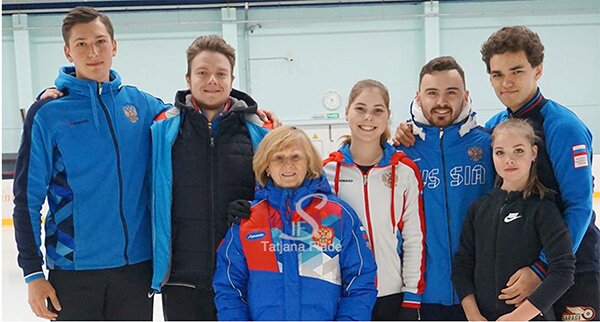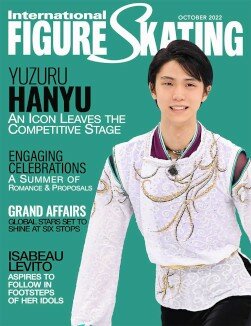

Ludmila Velikova and Nikolai Velikov are fixtures in the world of pairs. The husband and wife team have been coaching pairs skaters in St. Petersburg for decades and the family business expanded when their grandson, Vasilii Velikov, a former singles and pairs skater, joined the coaching team.
Though they are not household names today, Ludmila and Nikolai were a force in the 1990s. Among their success stories are 1994 World champions Evgenia Shishkova and Vadim Naumov; two-time World junior champions Maria Petrova and Anton Sikharulidze (1994, 1995); and 2000 World and European champions Maria Petrova and Alexei Tikhonov.
Nikolai coached Maxim Trankov and his former partner, Maria Mukhortova, to the 2005 World junior title. When that partnership ended, Ludmila attempted to arrange a pairing of Trankov and Tatiana Volosozhar, but it did not work out at that time. Ksenia Stolbova and Fedor Klimov also trained with the Velikovs before switching to Nina Mozer’s group.
The Velikov coaching trio is a successful combination of experience and youthful inspiration — Ludmila and Nikolai, who are both in their early 70s, and Vasilii, who at 25 is almost 50 years their junior. Vasilii said he never planned to coach pairs — it just happened naturally. As a 3-year-old, he would skate around in the corners of the rink while his grandparents were teaching their top pairs, and often tagged along with them to training camps.
He competed in singles until 2016 and also trained pairs, but retired because of back problems. “I learned all the pairs elements and that gave me a major push in my development as a coach,” Vasilii explained.
Ludmila said her grandson’s knowledge of triple jumps is a valuable resource. “I did all the jumps, but I did the easier versions. Now we have triples and combinations, and we are now doing triple Lutzes in pairs. It is good that he can skate well. I’m already a bit uncomfortable to skate. I can stand on the ice and explain something, but I can’t demonstrate anymore.”
Nikolai is also pleased to have his grandson on board, so he and Ludmila have someone to pass on their knowledge to. “He enjoys learning from us and he is a very curious guy. He is searching, he is watching, he has taken his path and this is great,” Nikolai said.
The trio have a solid family relationship, and if there are any arguments or disagreements “we find a common ratio, a common opinion,” Vasilii explained.
Dmitri Ialin, a junior pairs skater at the school, feels that having the mix of experience and youth in his coaching team is a positive. “It is sometimes easier to find a compromise when you speak the same language and are not so far apart in age. However, I also can speak the same language with Nikolai. He makes me joke with him even though I might not feel like it on that day.”
Though Mozer’s teams have dominated the senior pairs scene in Russia the past few years, the Velikovs are developing a strong group of future stars. Last season, three of their teams qualified for the Junior Grand Prix Final: gold medalists Anastasia Mishina and Aleksandr Galliamov; silver medalists Polina Kostiukovich and Ialin, and Ksenia Akhanteva and Valerii Kolesov, who ranked fourth.
Two of the teams the Velikovs coach stood on both the 2018 and 2019 World Junior podiums: Mishina and Galliamov, the reigning World junior champions, were third in 2018, and Kostiukovich and Ialin, the 2019 World junior bronze medalists, finished second a year earlier.
“How did we do that? Apparently, it is this group of skaters who are supportive of each other,” Ludmila said. “During the season, little clashes sometimes happen because of emotions, but in general the kids are very benevolent.”
“Everyone is competing against each other, and there is constant competition in the group — not only at competitions, but every day in practice. They are pushing each other,” Vasilii added.
The organization of their group is impressive. There are currently eight teams training with the Velikovs, which are split into two sub groups, according to their temperament. “We take those who can skate with Galliamov in one group because he is a very difficult boy. He is very emotional and he doesn’t like to be disturbed,” Ludmila explained.
“Akhanteva and Kolesov, and Tatyana Kuzmina and Alexei Khvalko work well with him. They are calm and peaceful, they never push, and they always give way. In the other group we have the lively Polina.”
“When you put them together, it’s a bomb. Therefore we split them up,” Vasilii said with a smile. “When Polina skates, she likes it that the others give way, therefore she skates with the younger teams who make sure to get out of her way.”
The skaters say they are very comfortable in their group and don’t mind the daily rivalry. “It is great because without competition it is almost impossible to skate well,” Mishina explained. “We see how the other pairs are skating and we try to be better than them and they try to be better than us. This way, we’re all growing together.”
“This doesn’t let us slack off. We’re trying to grow and the young, up and coming pairs are catching up with us. This takes pair skating to the next level,” added Galliamov.
Kostiukovich and Ialin agreed. “When there is competition, you are developing yourself,” Ialin said. “Sometimes you’re even looking at a young pair that just started who might do something like a step better than you, and you watch them and think, ‘you’ve been doing this for three years and how is it possible they’re doing it better than you are?’ All our top teams have something special and watching them, obviously you take something from them.”
Akhanteva and Kolesov also enjoy working in this group. “We have divided ice time, therefore everyone always gets enough attention,” Akhanteva explained. “We’re all getting along well and my best friends are Polina Kostiukovich and Tania Kuzmina. We socialize and hang out together on our days off.”
Mishina and Galliamov will move up to the senior level next season. Kostiukovich and Ialin, along with Akhanteva and Kolesov, will continue at the advanced junior level, and Kuzmina and Khvalko will be joining them on the junior circuit this year.
Nikolai said that in the past it was not easy to build a strong group, as there were not enough good singles skaters. “Now we are lucky, we have got good girls,” he said.
In fact, this has become the side effect of the current depth in Russian ladies’ skating. Competitors from Eteri Tutberidze’s group in Moscow dominate the discipline and, as it is so hard to break through, many talented girls are switching to pairs. “It is a shame that the coaches now think that they don’t need girls because all the girls are with Eteri anyway,” Ludmila said. “I don’t think that is right, but thanks to that we get girls with jumps. The coaches bring them to us — we don’t steal them.”
That was the case with Akhanteva, whose coach told her she was suitable for pairs and suggested that she try it. “I did, and after a short time Valerii showed up and we started skating together,” she said.
Last January, the Velikovs hired choreographer Denis Lunin, a former ice dancer and a friend of Vasilii’s. He assists with the footwork and in building the programs. He recently choreographed a new short program for Mishina and Galliamov to “tragic and lyrical music” (as they described it). They will keep their powerful “The Master and Margarita” long program from last season.
Even though Nikolai does not always agree with Lunin’s taste in music, he likes “that he is doing things in a completely different way. He has started only recently to work with us, but the results are already visible. He is doing a very good job.”
The coaching team is now looking ahead to the new season and hopes Mishina and Galliamov will make an impact at the senior level. Ludmila believes they are capable of doing it, “but we’ll see how things go because a lot depends on the competitions we get.”
The team is interested in learning a quad throw, but Ludmila is against the idea because “the risk of injury for the girl is very high. I am against it — you need to take validol (a tranquilizer) to watch that,” she said. “There have been horrible falls, but you cannot stop progress. If someone is doing it, everyone will go for it anyway.”
However, following the rule changes that offer higher rewards for clean programs, most teams stopped doing quads last season, including Kostiukovich and Ialin, who have landed a quad twist in the past. “It worked well, but then they decreased the value and now you get less for it than for a triple with pluses. It doesn’t make sense to do it,” Vasilii explained.
With or without quad throws, the Velikov junior teams look very promising. With pairs slated to be contested at only four of the seven Junior Grand Prix events this season (Lake Placid – New York, Chelyabinsk – Russia, Gdańsk – Poland, and Zagreb – Croatia), the battle for a place at the Junior Grand Prix Final will be tougher than ever before.
Mishina and Galliamov are hoping for a strong first full senior season. They finished fifth at Russian senior nationals last December and won the senior pairs event at the Inge Solar Memorial Challenger Series event in Austria.
RELATED CONTENT:
2019 JUNIOR GRAND PRIX SERIES
2019 GRAND PRIX SERIES




